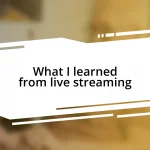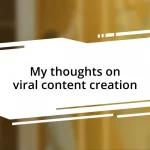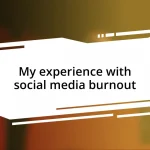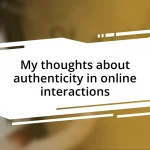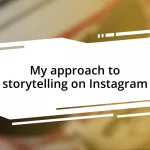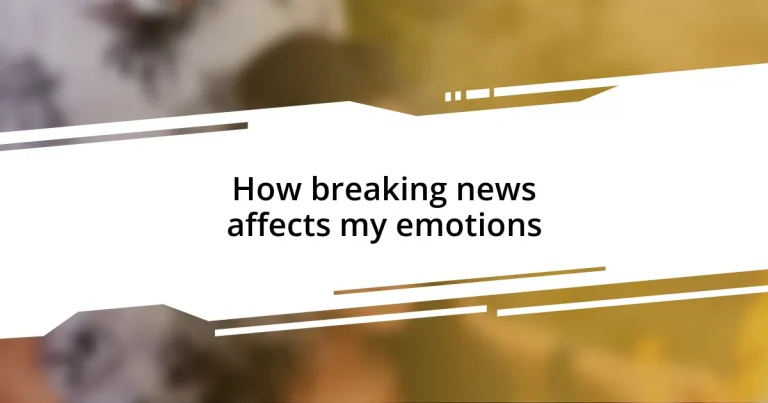Key takeaways:
- Breaking news can trigger intense emotional responses, leading to feelings of anxiety, fear, and even desensitization over time.
- Implementing intentional media breaks and focusing on uplifting content can help manage the emotional impact of distressing news.
- Building resilience involves mindfulness practices, engaging with diverse perspectives, and seeking support from others in times of emotional distress.
- Reflecting on and processing emotions through journaling or conversations can aid in understanding and coping with the impacts of news consumption.
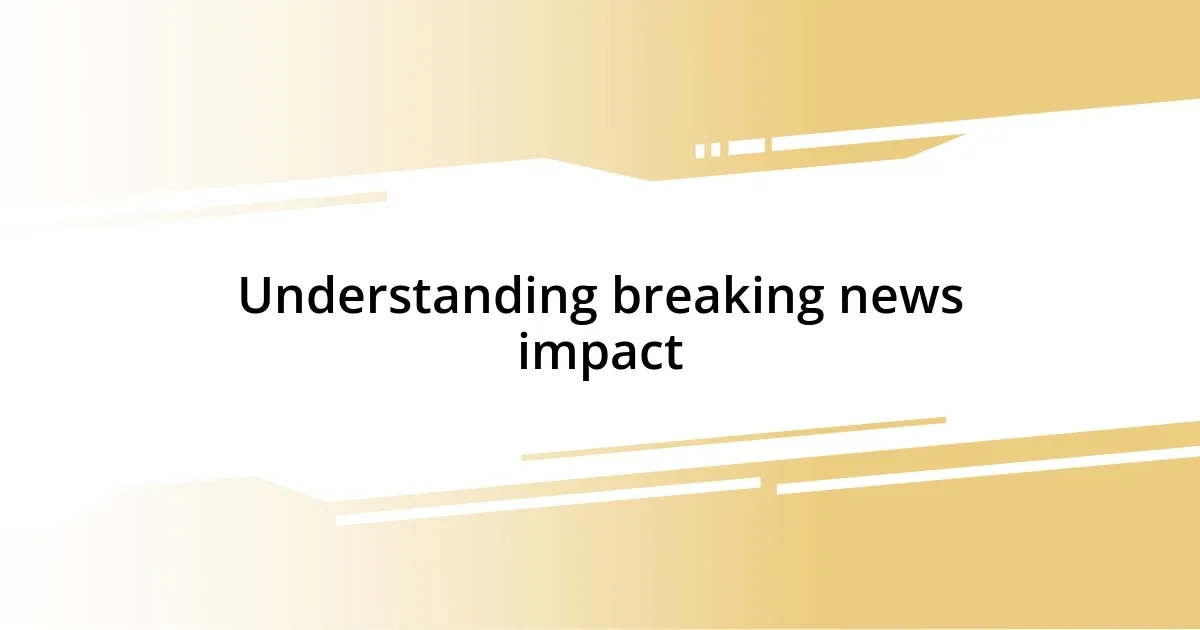
Understanding breaking news impact
Breaking news has a unique ability to elicit immediate emotional responses. I remember the first time I watched a major event unfold live on television; my heart raced as I felt the weight of the moment. It’s fascinating how that adrenaline rush can shift from shock to anxiety in just seconds—how does that make you feel when you find yourself in a similar state?
Sometimes, I find myself scrolling through news updates and realize I’m holding my breath, almost anticipating the next piece of information. The unpredictability of breaking news fuels a sense of urgency that can lead to feelings of helplessness or even fear. Have you experienced that moment when the news feels too heavy to bear?
Moreover, the act of digesting breaking news can feel like being on an emotional rollercoaster. One moment, I might feel a sense of hope with a positive development, and the next, a wave of sadness washes over me with tragic updates. How can we navigate these emotional highs and lows without feeling overwhelmed?
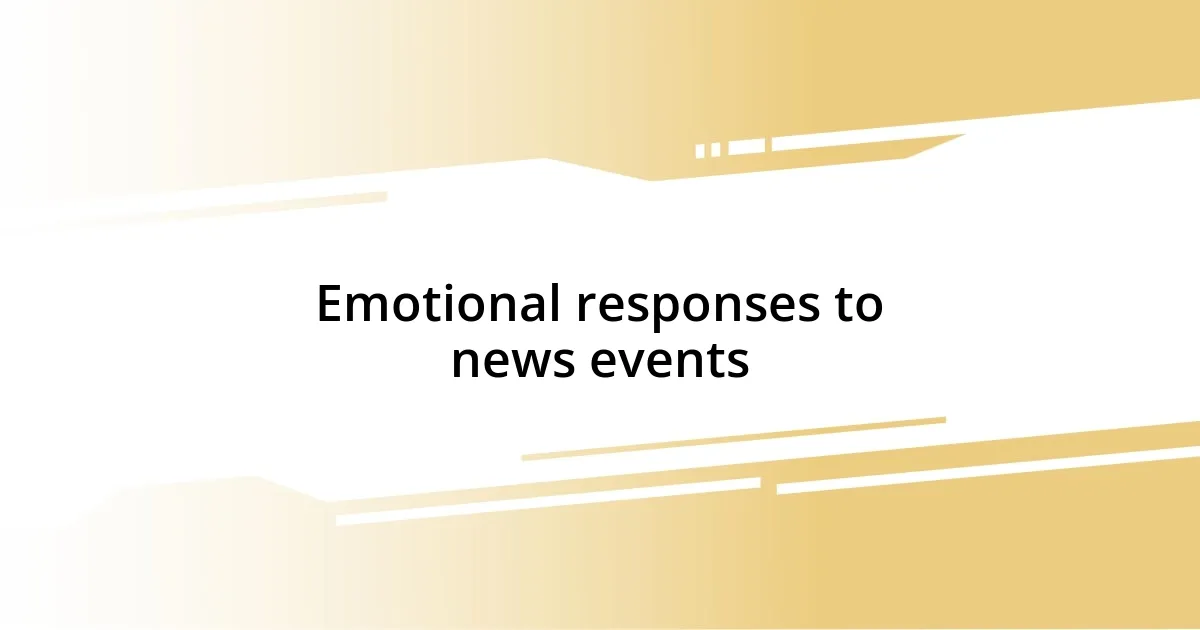
Emotional responses to news events
The emotional responses to breaking news can vary immensely based on the nature of the event. I still recall how I felt while watching the news about a major natural disaster. Initially, a sense of disbelief washed over me, followed by guilt for being safe while others suffered. It’s an unsettling mix of emotions that can leave one feeling mentally fragmented—have you ever felt a similar anguish?
Sometimes, when a significant political event unfolds unexpectedly, I notice my emotions take a different turn. The anger I feel can be directed at the situation, the people involved, or even at myself for feeling powerless to effect change. It’s painfully clear that these feelings not only impact my mood but can alter my entire day. I wonder, has political news ever left you feeling fueled by a desire to act or, conversely, paralyzed by frustration?
It’s essential to recognize how these emotional responses can impact our mental well-being over time. Prolonged exposure to distressing breaking news can lead to a phenomenon known as “news fatigue.” I’ve experienced it myself; too much exposure makes me want to disconnect completely. There’s a fine line between staying informed and being overwhelmed—how do you balance your news consumption to maintain your emotional health?
| Type of Event | Emotional Response |
|---|---|
| Natural Disaster | Disbelief, Guilt, Frustration |
| Political Unrest | Anger, Powerlessness, Motivation |
| Social Issues | Empathy, Sadness, Indignation |
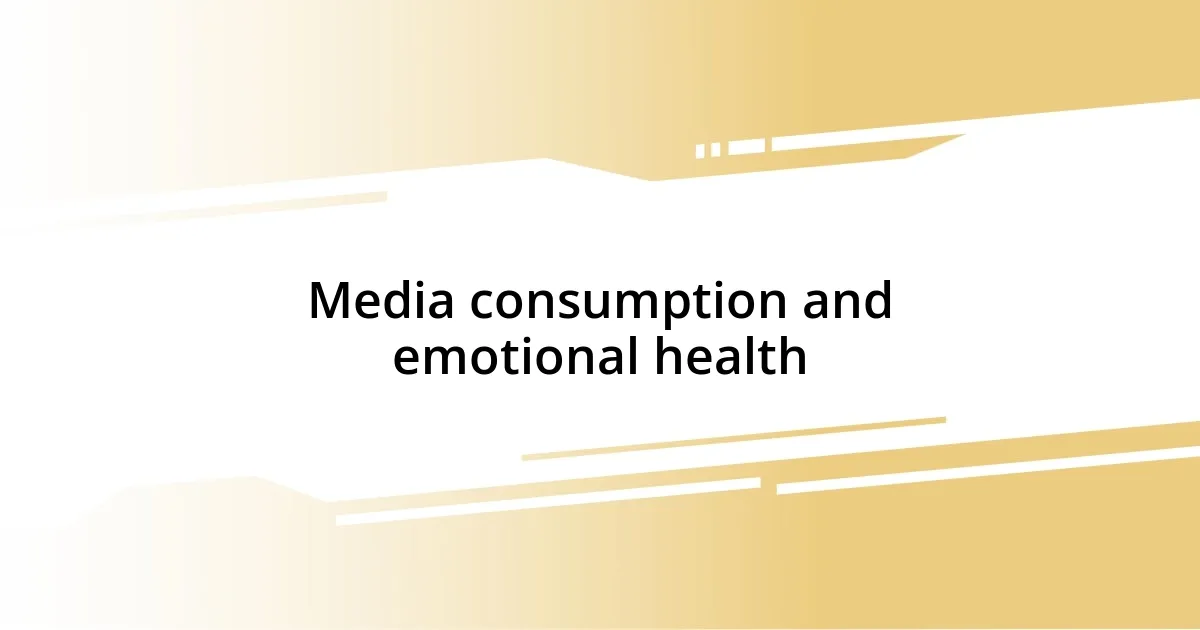
Media consumption and emotional health
Media consumption can profoundly influence emotional health, especially in today’s fast-paced digital landscape. I often notice that after a binge of breaking news, I feel emotionally drained, as if the weight of the world has settled on my shoulders. It’s surprising how one story can overshadow everything else in our minds, leading to heightened feelings of anxiety or sadness.
- Compulsive checking of news updates can foster a sense of unease, almost creating an addiction to stress.
- Emotional responses can be contagious; discussions around distressing news can amplify my own feelings of fear or anger.
- I sometimes find that more exposure leads to desensitization, a kind of protective mechanism, but I worry about losing empathy along the way.
Every so often, I catch myself getting sucked into the whirlwind of negative headlines. It’s like a snowball effect; one distressing story leads to another, and before I know it, I’m engulfed in a sea of anxiety. I’ve found that some days, minimizing my media consumption is a form of self-care—whether that means taking a break from news entirely or switching to lighter topics. Balance is essential for maintaining emotional health, don’t you think?
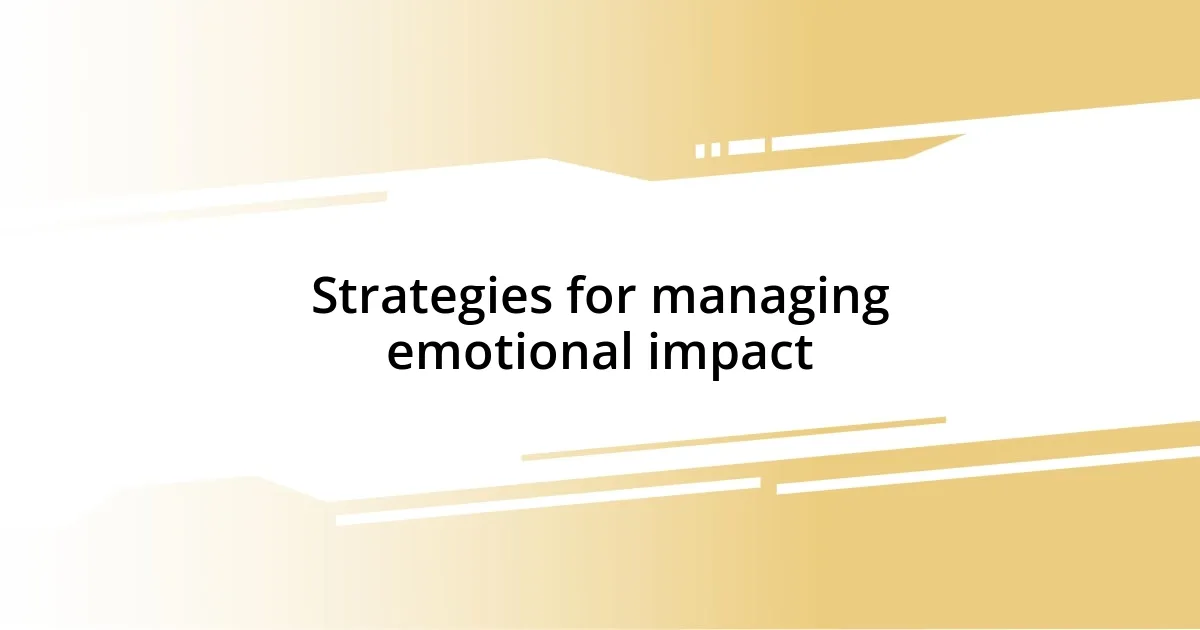
Strategies for managing emotional impact
Recognizing when the emotional impact of the news becomes too much is a crucial first step. I’ve had days where just a few headlines would leave me feeling suffocated, and that’s when I realized the importance of stepping back. How many times have you felt overwhelmed yet continued scrolling through stories, almost as if forcing yourself to stay informed would alleviate the anxiety?
One effective strategy I’ve discovered is implementing intentional media breaks. I remember a particularly chaotic week in the news cycle where I felt constantly on edge. During that time, I committed to unplugging from any news-related content for a couple of hours each evening. The result was remarkable; it gave my mind the space to breathe and process everything without the constant influx of new information. Have you tried setting boundaries on your media consumption?
Another useful tactic is to shift your focus toward more uplifting or constructive content. I often choose podcasts or books that inspire rather than dwell on the negative. Interestingly, I’ve found that engaging with stories of resilience or positive change not only lifts my mood but also offers a sense of hope amidst the chaos. Isn’t it fascinating how changing the narrative can help us reframe our emotional landscape?
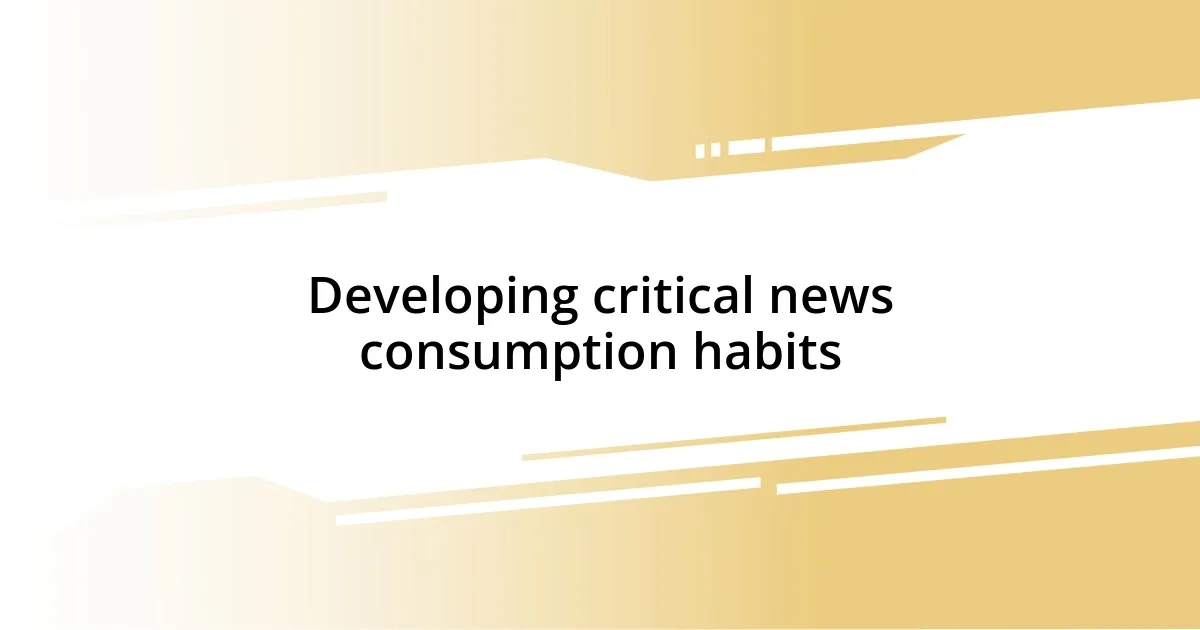
Developing critical news consumption habits
When it comes to developing critical news consumption habits, I’ve learned the power of questioning what I read. I used to accept headlines at face value, often feeling a surge of anxiety from sensationalized stories. Now, I pause and ask myself, “Is this information reliable? What’s the broader context?” This shift not only calms my emotional responses but also empowers me to distinguish between important news and the noise that often overwhelms us.
Another strategy I’ve implemented is surrounding myself with diverse perspectives. I’ll never forget the day I opened a discussion group where we dissected various news sources. Hearing alternative viewpoints challenged my assumptions and helped me understand the nuances of complicated issues. This practice not only alleviated the weight of a singular narrative but also fostered empathy, reminding me that news is often more complex than it appears.
Lastly, I prioritize time for reflection after consuming the news. I recall a moment after watching a particularly disturbing report; I felt a need to unpack my emotions. I took a walk, letting the fresh air clear my mind while contemplating the implications of what I’d just seen. It was during this time of reflection that I discovered journaling; it has become a vital tool for processing my thoughts. Have you ever tried reflecting in a way that helps you consciously separate your emotions from the information? It has truly reshaped my understanding of news consumption and emotional health.
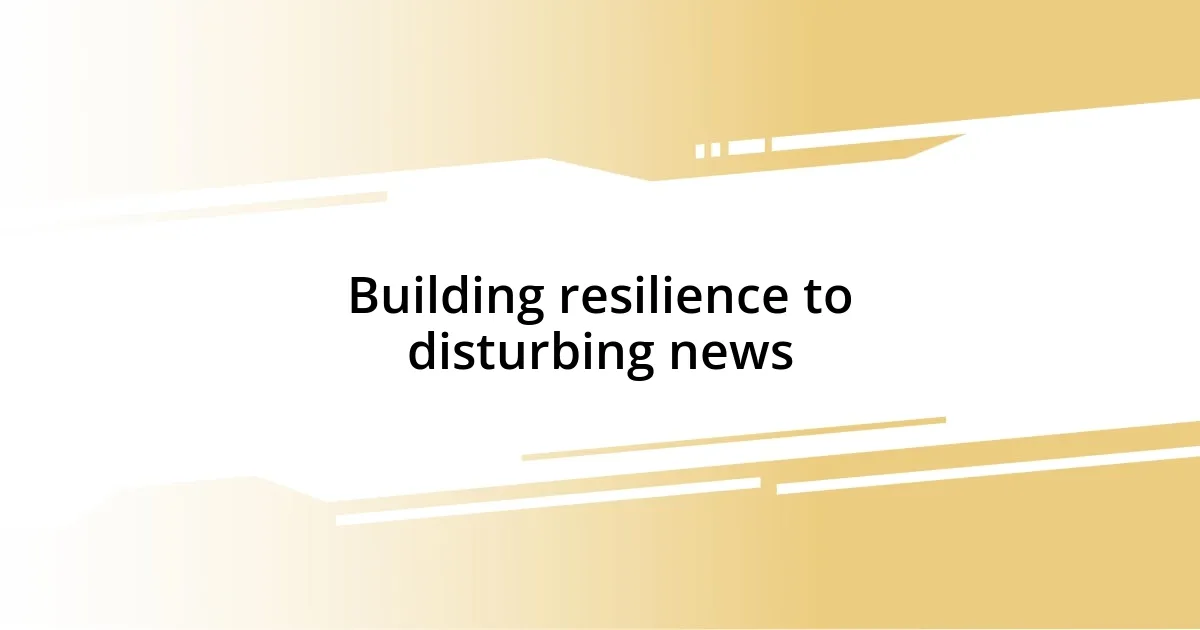
Building resilience to disturbing news
Building resilience to disturbing news is a journey that requires introspection and practice. For me, one of the most transformative experiences was when I realized how my immediate reactions to breaking news often clouded my judgment. I remember scrolling through my feeds during a national crisis; my heart raced, and I felt a tightness in my chest. It hit me then that I needed to create a buffer—allowing myself time to process before diving into the next headline. Have you found moments where a pause actually granted you clarity instead of anxiety?
I’ve found that cultivating mindfulness plays a significant role in building my resilience. One evening, after a particularly heart-wrenching news cycle, I took a few minutes to meditate. The focused breathing helped me regain control over my spiraling thoughts. Since then, I’ve made it a habit to incorporate short mindfulness practices into my day. Can you recall a time when taking a step back allowed you to find peace in chaos? Embracing mindfulness has offered me a sense of groundedness, making the emotional toll of the news more manageable.
Connecting with a supportive community can also bolster our ability to cope with disturbing news. I recall a group of friends gathering for a discussion on our emotional responses to current events. Sharing our feelings uncovered a mix of anger, sadness, and hope, making me realize I wasn’t alone in my distress. I’ve since leaned on these conversations when I feel overwhelmed. Isn’t it comforting to talk with others about what moves us deeply? These connections have become an essential part of my emotional toolkit, reminding me that resilience often flourishes in the company of others.
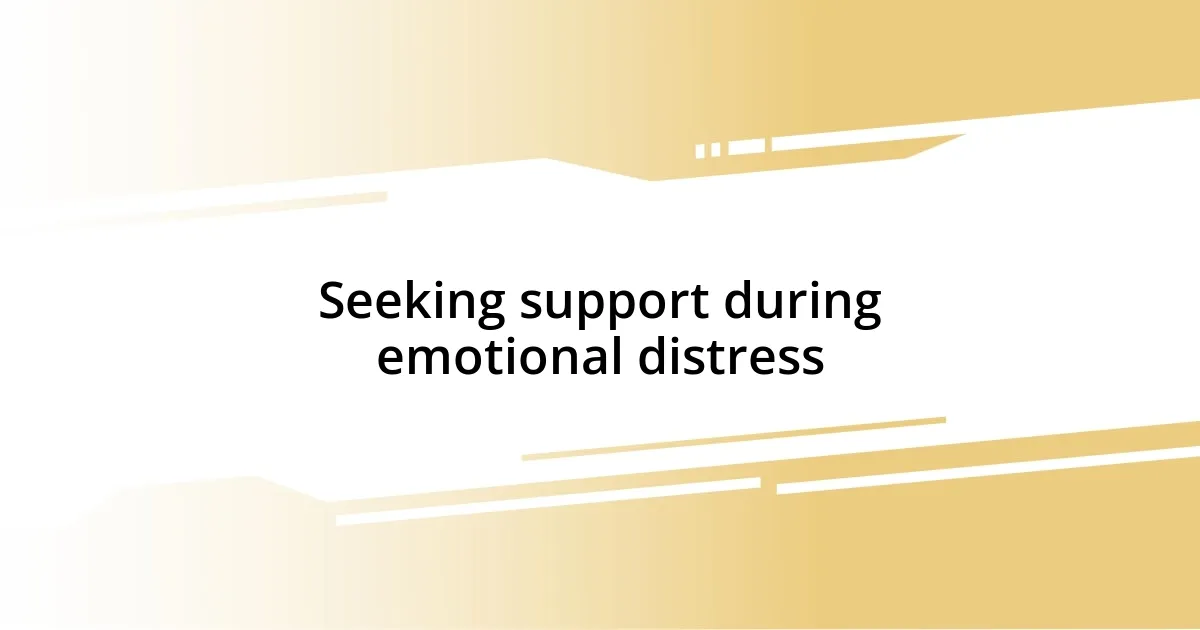
Seeking support during emotional distress
During emotional distress, seeking support can feel like a lifeline. I remember a time when I faced overwhelming sadness after a tragic event in the news. I reached out to a close friend, and our conversation transformed my despair into understanding. Have you ever felt that rush of relief just from talking to someone who gets it? Sharing my feelings not only lightened my emotional load but also created a bond of empathy between us.
Reaching out doesn’t always have to be in person, either. One day, I decided to join an online support group focused on navigating distressing news. The shared experiences were eye-opening. I realized that the emotions I thought were uniquely mine were echoed by many others. There’s a sense of safety in community, isn’t there? Becoming part of such a collective space fostered a supportive environment where vulnerability was celebrated, helping me feel less isolated.
Sometimes, simply articulating my feelings in a message or post brings clarity. I distinctly remember pouring my heart out on social media after a particularly distressing report. The outpouring of responses from fellow readers showed me that we all grapple with similar feelings. Have you noticed how putting your emotions into words can make them less daunting? It was eye-opening to witness the power of mutual support, reminding me that reaching out during tough times can create a ripple effect of healing.



